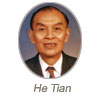AWARDEE OF LIFE SCIENCES PRIZE
HE FUCHU
He Fuchu, PhD, is the academician of the Chinese Academy of Sciences (2001). He was born in May 1962, in Anxiang County, Hunan Province. Dr. He received his B.S. degree in Genetics from Fudan University, Shanghai in 1982. Then he earned his M.S. degree in Biochemistry and Ph.D. in Cell Biology from Beijing Institute of Radiation Medicine. He is currently the professor of Beijing Institute of Radiation Medicine and the director of Chinese National Center of Biomedical Analysis. He was promoted as associate professor in 1990 and professor in 1992 respectively. He has been Doctor mentor since 1994. In 1998, he was appointed as the Director of Beijing Institute of Radiation Medicine. During 2003, he was appointed as the director of National Biomedical Analysis Center.
Dr. He found several periodic phenomena:“Development-related evolution” of cytokines; “Co-evolution”of cytokines and their receptors; “Modulated evolution”of mRNA coding regions and their non-coding regions; “Slowing-down evolution” of molecular among phylogeny. His team discovered, cloned, termed hepatopoietin (HPO) from human fetal liver, and demonstrated and characterized its features and those of its receptor as well. They discovered two important pathways of its signal transduction. To search more important factors from fetal liver, his lab established the world’s largest scale gene-expression profiles for liver and fetal liver. In addition, his team discovered, cloned and identified more than 500 human novel genes, most of which have been confirmed and characterized. Dr. He took the lead in sparkpluging and developing the proteomics research actively in China. He is the chief scientist of both the National “973” Project and the State Key Project of High-Tech program. Recently, as the chief scientist, he initiated a series of the Chinese Human Proteome Program, and then the international HUPO Human Liver Proteome Project (HLPP). He has been appointed as the Chair of HLPP Committee.
For his excellent scientific achievement, Dr. He was awarded the prize of Chinese Top 100 Young Fellows in Biomedicine in 1993, Chinese Top 100 Young Fellows in Science and Technology in 1994, National Distinguished Young Scientists Awards in 1996, Chinese “May 4” Young Elites Award in 2002, Chinese Young Scientists Award in 2002.
He holds several titles such as the member of Human Proteome Organization Council, the Senior editor of international key journal \[Proteomics\], the President of Chinese Human Proteome Organization, the vice president of Chinese Association of Genetics, the Director of National Biomedical Analysis Center, the deputy director of Human Genome Research Center at Beijing, the committee member of National Award for Science and Technology and the State Council of Academic Degree.






